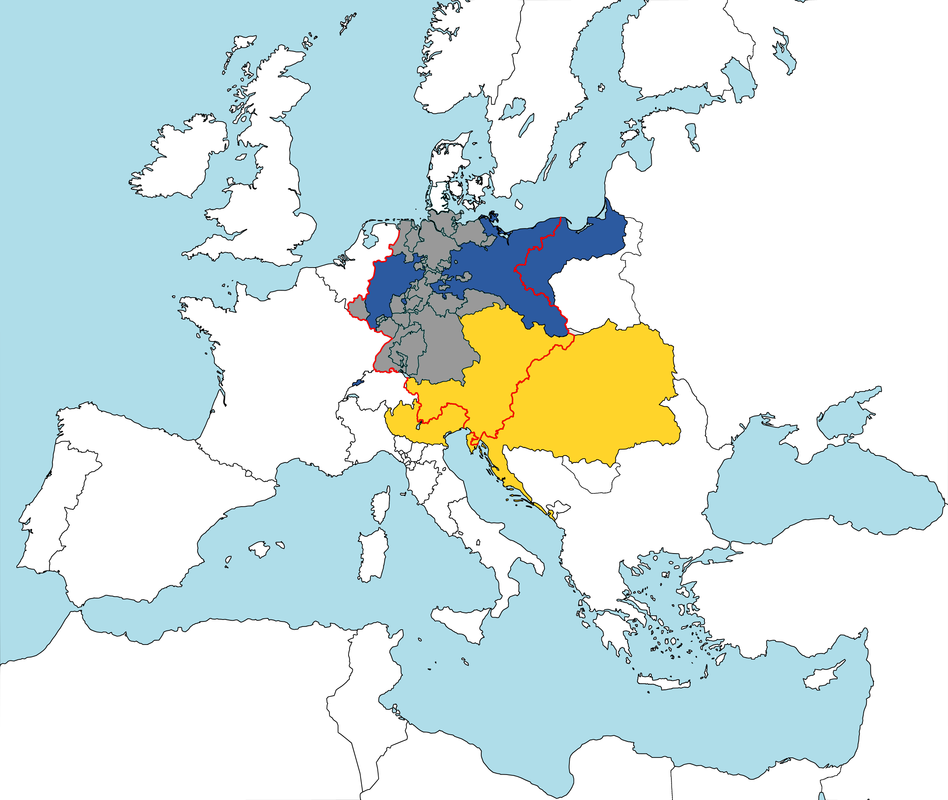To be fair, the nation of Germany was not truly Germany at the time of 1848. It was still a group of German principalities and city states ruled by the Baron or the Emperor of Prussia at the time. Though these principalities existed, there was an organized group which led the people of Germany as one country known as the German Confederation. The Confederation served its purpose as a standing formed government who did nothing more than just serve as a beacon. Created shortly after the fall of Napoleon, the Confederation was a direct product of the Congress of Vienna in order to replace the Holy Roman Empire. The main objective which the Congress of Vienna hoped for, however, was that the German Confederation would become a buffer zone between Austria and Prussia. The Confederation combined thirty five city states unto one government which then categorized the city states into provinces. In an attempt to combine the economic intentions of Europe, Prussia infiltrated the German Confederation with promises of economic stability and military aid when needed. This was generally not thought of as a problem since there had been peace for quite some time after the fall of Napoleon. The German Confederation always saw Prussia as a friend who could aid them when needed. But the hotbed of possible friction came on the borders of the Confederation, mainly France and Denmark as the year of 1848 neared.
It was this economic stability promised by Prussia which upset some of the working middle class as they wanted Germany to unify out of the Confederation. Many saw the Confederation as useless and without power since many of the principalities were still in control of the people. The German Confederation did no more than just become a beacon of power for a dull German Unification. The reaction from Prussian and Confederation powers stated that Germany was unified under the Confederation with aid from the Prussia empire. By 1842, the German economy began to boom without the help of Prussia as they discovered the industry through the influx of furnaces which they used to build the steel gun, cast-steel axles and breech loading rifle to name a few. The greatest part of this influx of industry was their advancement of weaponry which caused some concern in other nations. German security was at a high, but this movement brought down some economic measures of other nations such as Prussia, Austria and Great Britain who was supplying at least half of Germany's manufactured goods. The positive for Germany in this movement was that economic stability in their own right brought them closer to political unification.
Since it was the middle class which was bringing about the economic stability, there began to be this awareness that there was no need for those in power to be the ones to unify the country. In 1848, the German Confederation and the Prussian Empire went to war with Denmark over a border dispute in the province of Schleswig-Holstein which was the perfect cover for the middle class to revolt. While many other nations were going through revolution in 1848, none compare to the social aspect which Germany had created. In that year, Karl Marx and Friedrich Engels published The Communist Manifesto which became the cornerstone of the German Revolution. With its beginnings in the newspaper and the political spectrum, the German Revolution of 1848 would soon become militaristic in nature causing strife throughout the country. The revolution would also became the reason for the fall of the German Confederation and shortly after the Civil War, the country would unify under Otto von Bismark. It would be a long road for the people of Germany to be unified and only through great failure would they eventually become the country they are today.
The people who stood behind The Communist Manifesto would not be unified, however. As we will see in the coming parts of this series, the interpretation of the work will separate many of the Germans between true communism and socialism. The men who fought in the battles against Prussia and the German Confederation would part ways because of the interpretations of the work. The German Revolution of 1848 is possibly the most important of all of the revolutions of that year due to the lasting power of Karl Marx have on our society today. Throughout all of the Cold War, the issue of communism was a danger and there are those who remember the days of "I'd rather be dead than red." We do not think of the American Civil War when we think of communism or socialism, but it was extremely prevalent to society at that point. One thing is very important, however, when analyzing the communists and socialist in the Army of the Potomac at Gettysburg; they still fought for the Union while putting aside their political differences.
Join me next week when I talk about the Schleswig-Holstein War and the emergence of Alexander von Schimmelfennig.
Image courtesy of wikipedia.org
Special Thanks to Philip M. Cole for his work called You'll Be Scare. Sure - you'll be scared: Fear, Stress and Coping in the Civil War, (Ortanna: Colecraft Industries) 2010, pp. 72.

 RSS Feed
RSS Feed
